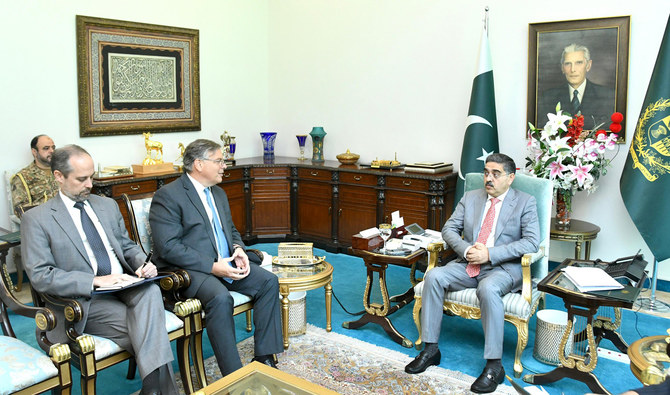PESHAWAR: The chief minister of Pakistan’s Khyber Pakhtunkhwa (KP) province, Ali Amin Gandapur, announced on Wednesday that the provincial government will hold a series of tribal council meetings or jirgas from August 2 to address people’s concerns, amid protests over the deteriorating law and order situation amid a fresh military operation in the restive Bajaur district.
Located in KP along the Afghan border, the northwestern Bajaur district has long experienced militant violence and multiple military operations, especially during the peak of the Tehreek-e-Taliban Pakistan (TTP) insurgency.
Hundreds of protesters, including tribal elders and youth, rallied on Wednesday in Bajaur district to express concern over the deteriorating law and order situation in the area, as the military launched an operation against militants that has left at least three civilians dead and seven injured, according to local representatives. Residents say they are opposing the latest offensive out of fear of displacement, as previous operations in the tribal belt, led to evacuations and long-term instability.
The unrest erupted following a three-day curfew imposed across 16 villages in Bajaur’s Loi Mamund tehsil, where the Pakistan Army began a counterterrorism operation codenamed “Sarbakaf” on July 29. The curfew, announced in a notification by the district’s deputy commissioner, aimed to “ensure public safety” amid intelligence reports of militant activity.
“I am starting jirgas [tribal councils] and from August 2, god willing, our jirgas will begin,” Gandapur said in a video message released by his office.
He added that at first, the jirgas will be held at the division level where all of the province’s local elders, political parties, political representatives, and stakeholders will sit together for consultations.
“The purpose of the consultations is to address the reservations and after these jirgas, we will hold a grand jirga in which we will give our policy, our plan and future strategy after sitting with all institutions,” the chief minister added.
The Pakistani military’s offensive triggered intense clashes with suspected militants, as local residents say the crossfire spilled into civilian areas, forcing many families to flee.
“The situation remains tense, and some families have already relocated to safer areas within the district,” Dr. Hamid ur Rehman, a provincial lawmaker from Bajaur affiliated with the Pakistan Tehreek-e-Insaf (PTI) party, told Arab News over the phone while confirming civilian casualties.
“The operation has been paused today, but there’s still fear in the air,” he added.
He said a provincial assembly session scheduled for August 1 would discuss the crisis.
Pakistan’s military did not respond to a request for comment from Arab News when this report was filed.
Nisar Muhammad, spokesperson for the provincial information department, said the government was “closely monitoring” the situation and had convened an apex committee meeting to review the security response.
“The curfew will be lifted in phases, depending on the ground situation,” he added. “Civilian safety is our priority.”
The escalation has drawn sharp criticism from political leaders.
Aimal Wali Khan, president of the Awami National Party, denounced the violence in a social media statement, saying, “The bloodshed in Bajaur must end.”
Malik Farman Ullah, a tribal elder, voiced frustration over the recurring violence in the region.
“Our people are exhausted from burying the dead,” he said. “We demand that militants and security forces keep their clashes away from civilian homes.”
The Bajaur operation comes amid renewed concerns about the TTP’s presence along the Afghan border and a broader uptick in militant violence across Khyber Pakhtunkhwa.
The provincial administration, led by Gandapur, has called for greater provincial involvement in security decisions, emphasizing the need to balance counterterrorism with civilian protections.
As tensions rise, the federal and provincial governments face growing pressure to restore stability without repeating past cycles of violence in the tribal belt.


















